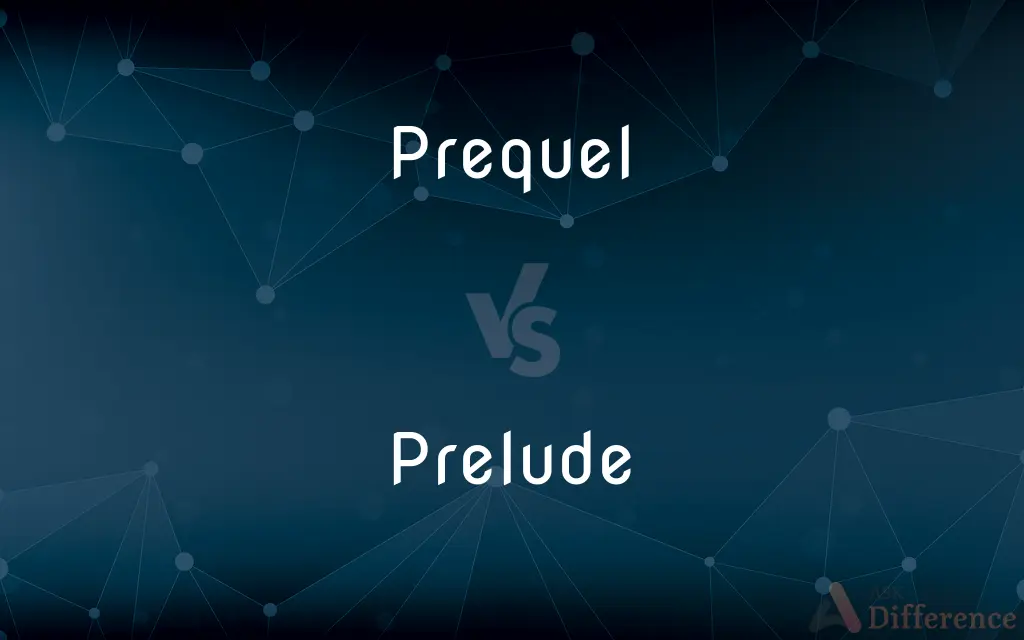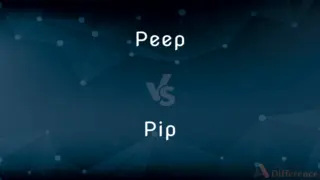Prequel vs. Prelude — What's the Difference?
Edited by Tayyaba Rehman — By Fiza Rafique — Updated on April 26, 2024
Prequel is a work that narrates events preceding an original story, focusing on backstory and characters; whereas, prelude acts as an introductory piece to a larger work, setting tone or context.

Difference Between Prequel and Prelude
Table of Contents
ADVERTISEMENT
Key Differences
A prequel is typically a literary, film, or other media work that explores events that occur before the main story, often to provide deeper insight into characters or settings. Whereas, a prelude serves as an introductory section of a larger performance or work, often in music or literature, setting the stage for what follows.
Prequels are common in narrative-driven media like books and movies, where they are used to expand upon the universe established by an earlier work. On the other hand, preludes are often found in classical music, operas, and books, where they establish a thematic or emotional foundation for the audience.
In cinema or television, a prequel can stand alone as a complete story but is enriched by knowledge of the subsequent (previously released) work. Conversely, a prelude is generally shorter, sometimes only a few pages or minutes long, and acts more as a scene-setter rather than a standalone story.
Prequels often delve into the backgrounds of characters or events that fans are already familiar with, providing a new perspective or additional depth. In contrast, preludes might introduce themes, motifs, or a mood without necessarily detailing characters or plot points.
The creation of a prequel usually requires consideration of previously established lore and timelines, ensuring continuity and coherence with the original work. Preludes, however, are typically more flexible, focusing on style and atmosphere rather than concrete narrative details.
ADVERTISEMENT
Comparison Chart
Definition
A work that precedes the main story in a narrative sequence.
An introductory piece to a larger creative work.
Typical Use
Expands the backstory or explains earlier events of a narrative.
Sets the tone, mood, or context for the main work.
Common Formats
Films, books, series
Musical compositions, literary prologues
Narrative Dependency
Often relies on the audience's familiarity with the original story.
Does not depend on a larger narrative, but introduces one.
Length
Can be as long as the original work
Usually short and concise
Compare with Definitions
Prequel
A narrative work set before the events of a previously completed story.
The prequel to the popular series explores the protagonist's life before the main events.
Prelude
An introductory piece of music or literature that precedes and sets the tone for the main work.
The prelude to the concert featured a soft, melancholic melody that perfectly set up the dramatic finale.
Prequel
Explores earlier timelines that are crucial to the main storyline.
In the prequel, the origins of the conflict were finally revealed.
Prelude
An initial section of a piece that introduces themes or settings.
The novel's prelude was a poetic description of the setting sun over the mountains.
Prequel
A story or film that tells what happened before the original plot.
Fans were excited for the prequel because it promised to delve into the hero's mysterious past.
Prelude
Often used in music to introduce the main musical statement.
The orchestra began with a prelude that echoed the themes of the upcoming symphony.
Prequel
Used to provide background and context to an existing story.
The prequel was necessary to understand the complex politics in the main series.
Prelude
Serves as an opening to a formal event or larger work.
The prelude at the gallery opening captured the essence of the art on display.
Prequel
A prequel is a literary, dramatic or cinematic work whose story precedes that of a previous work, by focusing on events that occur before the original narrative. A prequel is a work that forms part of a backstory to the preceding work.
Prelude
May serve a purely aesthetic purpose, enhancing the overall experience.
The poetic prelude was a beautiful way to begin the play, setting an introspective mood.
Prequel
A story or film containing events which precede those of an existing work
The film is a prequel to the cult TV series
Prelude
An action or event serving as an introduction to something more important
A ceasefire had been agreed as a prelude to full peace negotiations
Prequel
A literary, dramatic, or cinematic work whose narrative takes place before that of a preexisting work in the same series.
Prelude
An introductory piece of music, most commonly an orchestral opening to an act of an opera, the first movement of a suite, or a piece preceding a fugue.
Prequel
(narratology) In a series of works, an installment that is set chronologically before its predecessor, especially the original narrative or (perhaps improper usage) any narrative work with at least one sequel.
Prelude
Serve as a prelude or introduction to
The bombardment preluded an all-out final attack
Prelude
An introductory performance, event, or action preceding a more important one; a preliminary or preface.
Prelude
A piece or movement that serves as an introduction to another section or composition and establishes the key, such as one that precedes a fugue, opens a suite, or precedes a church service.
Prelude
A similar but independent composition for the piano.
Prelude
The overture to an oratorio, opera, or act of an opera.
Prelude
A short composition of the 1400s and early 1500s written in a free style, usually for keyboard.
Prelude
To serve as a prelude to.
Prelude
To introduce with or as if with a prelude.
Prelude
To serve as a prelude or introduction.
Prelude
An introductory or preliminary performance or event.
Prelude
(music) A short, free-form piece of music, originally one serving as an introduction to a longer and more complex piece; later, starting with the Romantic period, generally a stand-alone piece.
Prelude
(programming) A standard module or library of subroutines and functions to be imported, generally by default, into a program.
Prelude
(figurative) A forerunner to anything.
Prelude
To introduce something, as a prelude.
Prelude
To play an introduction or prelude; to give a prefatory performance.
Prelude
An introductory performance, preceding and preparing for the principal matter; a preliminary part, movement, strain, etc.; especially (Mus.), a strain introducing the theme or chief subject; a movement introductory to a fugue, yet independent; - with recent composers often synonymous with overture.
The last Georgic was a good prelude to the Ænis
The cause is more than the prelude, the effect is more than the sequel, of the fact.
Prelude
To play an introduction or prelude; to give a prefatory performance; to serve as prelude.
The musicians preluded on their instruments.
We are preluding too largely, and must come at once to the point.
Prelude
To introduce with a previous performance; to play or perform a prelude to; as, to prelude a concert with a lively air.
Prelude
To serve as prelude to; to precede as introductory.
[Music] preluding some great tragedy.
Prelude
Something that serves as a preceding event or introduces what follows;
Training is a necessary preliminary to employment
Drinks were the overture to dinner
Prelude
Music that precedes a fugue or introduces an act in an opera
Prelude
Serve as a prelude or opening to
Prelude
Play as a prelude
Common Curiosities
Do prequels always follow the same style or genre as the original?
Not necessarily. While prequels often maintain the genre to keep continuity with the original, they may vary in style or focus, sometimes exploring different themes or characters.
How does a prequel relate to the original work?
A prequel is directly connected to the original work by exploring its backstory or characters' earlier lives, aiming to add depth and context to the existing narrative.
Is a prelude necessary for understanding the main work?
No, a prelude is not necessary for understanding the main work but enhances the experience by setting the emotional or thematic tone.
What are common examples of prequels in film?
Popular examples include "Star Wars: Episode I – The Phantom Menace," which is a prequel to the original "Star Wars" trilogy, detailing the earlier events of the saga.
Can a prelude be a standalone work?
Yes, while often introductory, preludes can also be standalone works, especially in music, where they are complete compositions in themselves.
What makes a prelude effective in literature?
An effective prelude in literature captures the reader's interest with engaging themes or questions, establishes the mood, and smoothly transitions into the main narrative.
What challenges do writers face when creating prequels?
Writers face challenges in maintaining consistency with the established timeline and character development of the original story, while also crafting a compelling pre-story that stands on its own.
How do prequels affect a franchise?
Prequels can rejuvenate interest in a franchise, attract a new audience, and offer opportunities for further creative development and merchandising.
What are common examples of preludes in music?
Well-known preludes include Chopin’s "Prelude in E-minor" and Bach’s "Prelude No. 1 in C major" from The Well-Tempered Clavier, both setting stylistic tones for subsequent pieces.
Why do creators choose to write prequels?
Creators write prequels to deepen the backstory, provide answers to unresolved questions, and expand the universe of their narratives, often to enhance fans' connection to the story.
Can prequels change the perception of the original story?
Yes, prequels can significantly alter how audiences understand the original story, providing new insights into characters' motivations or events that can change their overall perception.
Are preludes common in modern music?
Yes, preludes are still common in modern classical music compositions and are also used in albums to set the tone for the rest of the musical work.
How do audiences generally react to prequels?
Audience reactions to prequels can vary widely; they can be well-received if they effectively enrich the original story, or criticized if perceived as unnecessary or inconsistent.
What is the purpose of a prelude in a play?
In a play, a prelude serves to introduce the audience to the play's setting, key themes, or conflicts, priming them for the drama to unfold.
Can prequels be made after the original author’s time?
Yes, prequels can be and often are written by different authors after the original author’s time, especially in popular franchises, though this can sometimes lead to debates about authenticity and quality.
What distinguishes a good prequel from a bad one?
A good prequel deepens the audience's understanding and enjoyment of the original story through meaningful storytelling and character development, whereas a bad prequel may fail to add value or contradict established facts of the original.
Share Your Discovery

Previous Comparison
Peep vs. Pip
Next Comparison
Operate vs. WorkAuthor Spotlight
Written by
Fiza RafiqueFiza Rafique is a skilled content writer at AskDifference.com, where she meticulously refines and enhances written pieces. Drawing from her vast editorial expertise, Fiza ensures clarity, accuracy, and precision in every article. Passionate about language, she continually seeks to elevate the quality of content for readers worldwide.
Edited by
Tayyaba RehmanTayyaba Rehman is a distinguished writer, currently serving as a primary contributor to askdifference.com. As a researcher in semantics and etymology, Tayyaba's passion for the complexity of languages and their distinctions has found a perfect home on the platform. Tayyaba delves into the intricacies of language, distinguishing between commonly confused words and phrases, thereby providing clarity for readers worldwide.
















































